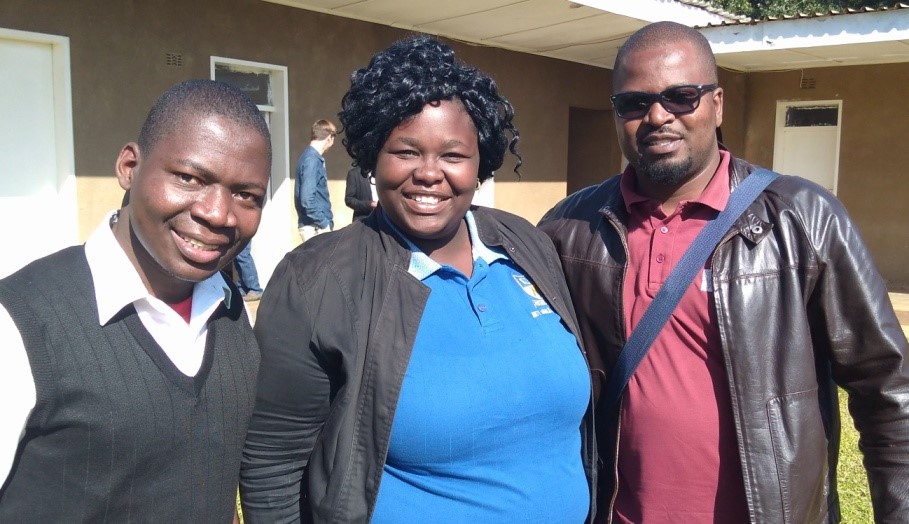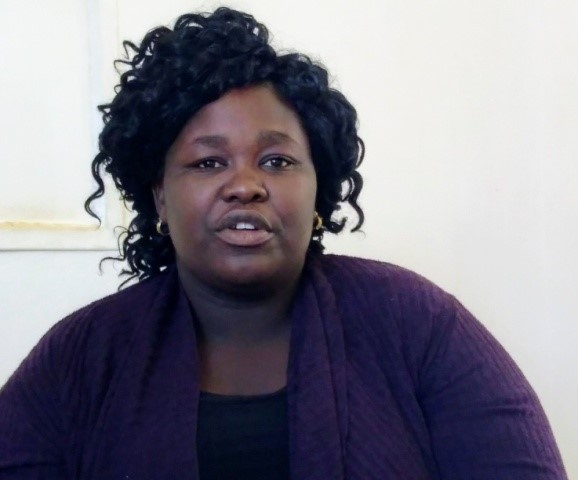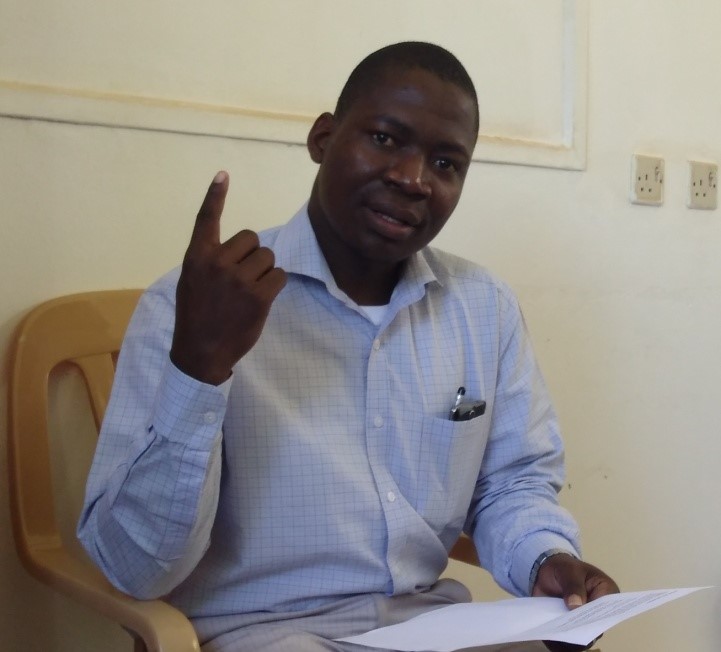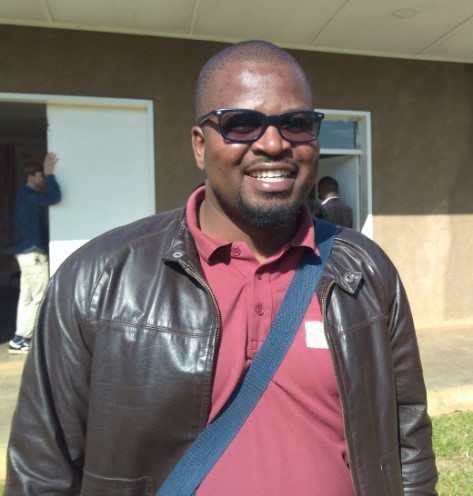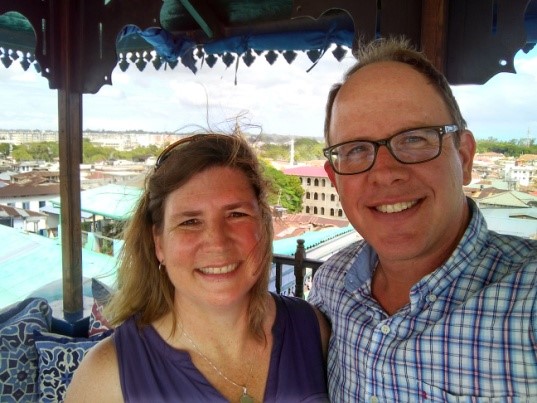A Letter from Dustin and Sherri Ellington, serving in Zambia
May 2018
Write to Dustin Ellington
Write to Sherri Ellington
Individuals: Give online to E200478 for Dustin and Sherri Ellington’s sending and support
Congregations: Give to D507543 for Dustin and Sherri Ellington’s sending and support
Churches are asked to send donations through your congregation’s normal receiving site (this is usually your presbytery).
Dear Friends,
Greetings from Zambia. I (Dustin) find it enlightening to listen to my students talk openly about their experience of the church. I think you would, too. Recently, I sat with three students and asked three big questions of each. This time, I wrote down their answers to share. Perhaps their words will touch your hearts and give you insight into the church in this part of the world.
1. When you think of your church in your home country, what encourages you and leads you to thank God?
Naomi Daka (second-year student from Zambia): The zeal that people have to worship God really makes me thank God. People have zeal for Sundays. There are a variety of motives, but it’s still encouraging to see. People really want to be part of church. Something additional is the inclusiveness … [towards] female ministers; this really makes me thank God for my church. And the encouragement we ministers get from the church to further our studies also encourages me.
John Mokotha (second-year student from Malawi): We need to thank God that people value being members of the church so, so much. When there are programs, people really come out and participate.
Willingmore Mhlanga (fourth-year student from Zimbabwe): The New Testament speaks of holding on and holding fast, and that’s what I see in my church — a church holding on. As a country, we had been going backwards for twenty years, yet I see the fact that so many people haven’t given up. With the recent events of the change in the government, we as a church play a role in the rebuilding of our country. We have a rediscovery of the prophetic voice in the church to speak to the government and to the powers that be. And the new president is inviting the church to do more and say more. This is an opportune time to spread the gospel and preach that God is there in our circumstances. The gospel doesn’t remain in the pages of the Bible; it is very alive now. The church has been called for a time such as this.
2. What concerns you when you look at the church in your home country, so Christians in America can join your concern and pray for believers there?
Naomi: I spoke earlier of zeal but varying motives. It’s also my concern, and I pray I don’t fall into it, that the ministers often want to go to urban congregations [where the pay is better]. Yet the people in the rural areas need to hear the word of God. Pray that we ministers can hear the voice of God, and also that God will provide for those who minister in rural areas. We can also pray that ministers will remember their first call, when they said they would go anywhere.
John: As I’ve said, people like going to church. The problem that concerns me is that we are lacking genuinely transformed believers in the church. They participate. But it’s also very hard to distinguish a believer and an unbeliever in terms of people’s character and their daily lives. This makes me wonder if the word of God has impacted people’s lives. It’s like people are exercising Christianity as part of a culture, without really looking at the impact of the Christian message.
Willingmore: Zimbabwe is a country where the economy is not functioning. We have over 90% unemployment, and you can only imagine the poverty with statistics like that. People are struggling with hunger. I know so many young people who’ve left my home congregation to go to other countries to find work. They have degrees from universities, and they are leaving. They have so much to bring to the country, but there’s an exodus. People have plans and dreams, but they lack a way to realize them because it’s a country where dreams of young people are shattered. So my wife and I are excited to go back home and minister, but we also realize challenges are ahead.
3. Are there ways your education at Justo Mwale University is giving you hope by equipping you to face these challenges and concerns? How so?
Naomi: JMU is equipping me with an openness to learn. I’m learning about contextualizing the word and becom[ing] a listening minister. My education here has also taught me humility. Being humble is more important than the grades I receive.
John: JMU is helping me to understand the word of God deeply, and also good ways of approaching people in society, so that the word of God can impact people’s lives. I used to read the Scripture and then just start preaching. Now I am learning to understand the text and find the real message that God wants to communicate to people. Before coming here, I was a judgmental preacher. Now I understand God’s grace and love more, and I have a different approach to people. JMU has helped me understand cultures and speaking the word to different cultures. I’m learning that I need to understand people first and approach them in a way that helps them discover for themselves that certain behaviors like womanizing and drunkenness are wrong, instead of first accusing my listeners.
Willingmore: Studying the Bible at Justo Mwale has helped me know why I came here. Being here has been a time of being equipped with truth. To be entrusted to go and share this word, it will not only encourage and give hope to people back home, including myself, but it will give people the reality that God is with us. That’s reality — God is with us as Zimbabweans. If our situation changes for the better, praise God. If it gets worse, praise God. But God is with us.
I’ve also been equipped to be responsible in handling Scripture. Many preachers have taken advantage of our situation in Zimbabwe and of how desperate people are. So people are falling for anything that looks like a quick fix. Almost every week as I read the papers from back home, I see there are pastors or prophets who have swindled people. But being at JMU has equipped me to be faithful and not take advantage of people. I’m to say what the word of God says, and I’m to join with fellow believers in discerning what the will of God is from the Scriptures.
My courses have also played an important role in saying we can be holistic in our approach to preaching Christ. We can be alive to the realities in our society. We fulfill Christ’s mandate as we go out and make disciples of all. What would be the relevance of the church if it just focuses inwardly and wants to protect itself and feel comfortable without going out and affecting society for God’s glory?
_______________________
As you think about these words from Naomi, John, and Willingmore, I invite you to ask how they speak to you and your church where you are. I also invite you to join me in thanking God for these students and for what’s really positive in their churches, and to pray for the students and their concerns for their churches and countries.
If you would like to give toward Justo Mwale University student scholarships, click here (and add a comment/instruction specifying “Scholarships”). Sherri and I also say thanks to all of you who give toward our sending and support through Presbyterian World Mission. Consider giving now by clicking here. We also thank all of you who partner with us through prayer. You are helping to make our life and ministry in Zambia a reality.
Yours in Christ,
Dustin (and Sherri) Ellington
ellingtondustin@gmail.com
so.ellington@gmail.com
![]() You may freely reuse and distribute this article in its entirety for non-commercial purposes in any medium. Please include author attribution, photography credits, and a link to the original article. This work is licensed under a Creative Commons Attribution-NonCommercial-NoDeratives 4.0 International License.
You may freely reuse and distribute this article in its entirety for non-commercial purposes in any medium. Please include author attribution, photography credits, and a link to the original article. This work is licensed under a Creative Commons Attribution-NonCommercial-NoDeratives 4.0 International License.
